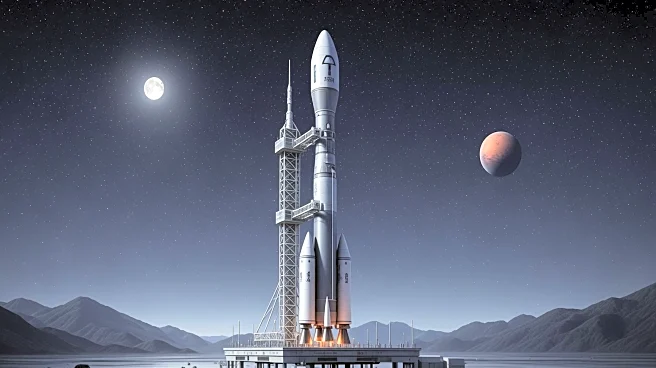What's Happening?
Blue Origin is preparing for the second launch of its New Glenn rocket, scheduled for November 9, 2025. This mission will carry NASA's ESCAPADE twin probes to Mars, aiming to study the planet's magnetosphere
and space weather. The launch marks a significant step for Blue Origin, following its first successful orbital mission in January 2025, despite a failed booster landing. The company is confident in achieving a successful booster recovery this time, which could enhance its launch cadence and reduce costs. Preparations have included a successful static fire test and payload integration, with the launch window set between 2:45 p.m. and 5:11 p.m. EST.
Why It's Important?
This launch is crucial for Blue Origin as it seeks to establish itself as a major player in the commercial spaceflight industry, competing with companies like SpaceX. A successful mission could validate Blue Origin's reusable rocket technology, potentially attracting more clients and investment. The mission also highlights the growing collaboration between private companies and government agencies like NASA, which is leveraging commercial rockets for cost-effective science missions. Success in this mission could position New Glenn as a viable alternative to SpaceX's Falcon 9 and Heavy, impacting the broader space industry.
What's Next?
If successful, Blue Origin plans to use the recovered booster for future missions, including deploying the Blue Moon Mark 1 lunar lander. The company is also eyeing contracts for national security payloads and human spaceflight. The outcome of this launch could influence Blue Origin's role in Mars exploration and its competitiveness in the space industry. Regulatory oversight from the FAA ensures safety, and a successful landing would further validate Blue Origin's technology.
Beyond the Headlines
This mission contributes to the burgeoning space economy, valued at hundreds of billions. By enabling affordable access to space, companies like Blue Origin drive innovation in satellite deployment and planetary science. NASA's partnership signals trust in commercial capabilities, paving the way for future collaborations like Artemis lunar missions. Success here could accelerate Blue Origin's role in Mars exploration, complementing efforts by NASA and international partners.











